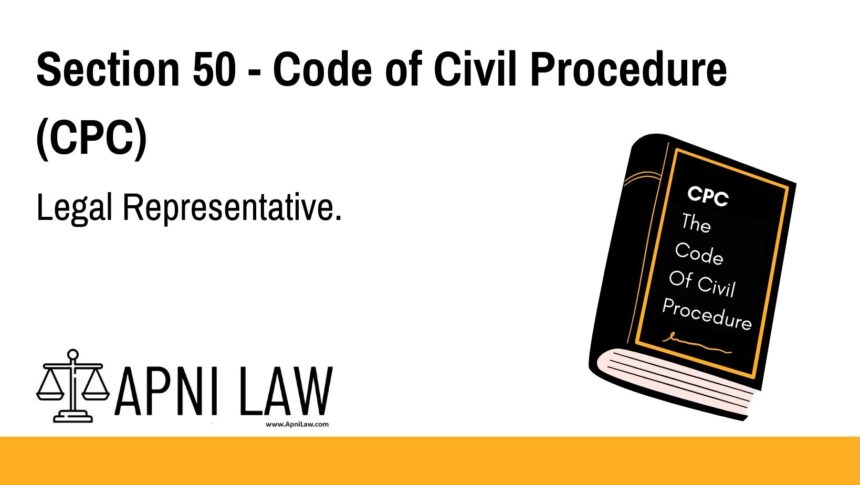Code
CPC(1) Where a judgment-debtor dies before the decree has been fully satisfied,
the holder of the decree may apply to the Court which passed it to execute the same against the legal
representative of the deceased.(2) Where the decree is executed against such legal representative, he shall be liable only to the extent of
the property of the deceased which has come to his hands and has not been duly disposed of; and, for the
purpose of ascertaining such liability, the Court executing the decree may, of its own motion or on the
application of the decree-holder, compel such legal representative to produce such accounts as it thinks
fit.
Great! Now we are at Section 50 CPC – Execution of Decree against Legal Representatives. Below is the structured SEO-optimized ApniLaw-style article:
Section 50 CPC: Execution of Decree against Legal Representatives
Code
Section 50 – Code of Civil Procedure, 1908
(1) Where a judgment-debtor dies before the decree has been fully satisfied, the holder of the decree may apply to the Court which passed it to execute the same against the legal representative of the deceased.
(2) Where the decree is executed against such legal representative, he shall be liable only to the extent of the property of the deceased which has come to his hands and has not been duly disposed of; and, for the purpose of ascertaining such liability, the Court executing the decree may, of its own motion or on the application of the decree-holder, compel such legal representative to produce such accounts as it thinks fit.
📖 Source: Section 50 CPC – Execution of Decree against Legal Representatives (ApniLaw)
Explanation
- When a judgment-debtor dies before a decree is fully satisfied, the decree-holder is not left without remedy.
- The decree can be executed against the legal representatives (LRs) of the deceased.
- However, the liability of legal representatives is not personal. They are liable only to the extent of the estate of the deceased that comes into their hands and remains undisposed of.
- The Court may also require legal representatives to submit accounts of assets they received from the deceased judgment-debtor to determine their liability.
Illustrations
- Example 1 – Limited liability of LR
- X obtains a money decree against Y.
- Y dies leaving ₹5,00,000 worth of property to his son Z (legal representative).
- If X applies for execution, Z will be liable only to the extent of ₹5,00,000 (the estate received), not beyond.
- Example 2 – No estate, no liability
- If the legal representative inherits nothing from the deceased judgment-debtor, he cannot be made personally liable for the decree.
Common Questions and Answers
1. What happens if the judgment-debtor dies during execution proceedings?
👉 The decree-holder can continue execution proceedings against the legal representatives under Section 50 CPC.
2. Are legal representatives personally liable for the decree?
❌ No. They are liable only to the extent of the deceased’s estate in their possession.
3. Can the court compel legal representatives to produce accounts?
✅ Yes. Section 50(2) expressly allows the court to require LRs to produce accounts of the deceased’s estate.
4. What if multiple legal representatives inherit property?
👉 Each legal representative is liable to the extent of the estate he/she has received.
5. Can a decree-holder directly sue the legal representative instead of execution?
⚖️ No separate suit is required. The proper remedy is to apply for execution under Section 50 CPC.
Conclusion
Section 50 CPC ensures that a decree does not become unenforceable due to the death of the judgment-debtor. It balances the rights of decree-holders with the protection of legal representatives by making them liable only to the extent of estate inherited, and not personally.
👉 Read More: Section 50 CPC – Execution of Decree against Legal Representatives (ApniLaw)








